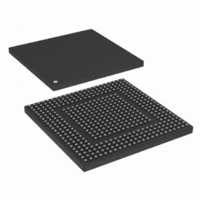MPC8308VMAGD Freescale Semiconductor, MPC8308VMAGD Datasheet - Page 156

MPC8308VMAGD
Manufacturer Part Number
MPC8308VMAGD
Description
MPU POWERQUICC II PRO 473MAPBGA
Manufacturer
Freescale Semiconductor
Datasheets
1.MPC8308VMAGD.pdf
(90 pages)
2.MPC8308VMAGD.pdf
(2 pages)
3.MPC8308VMAGD.pdf
(1170 pages)
4.MPC8308VMAGD.pdf
(14 pages)
Specifications of MPC8308VMAGD
Processor Type
MPC83xx PowerQUICC II Pro 32-Bit
Speed
400MHz
Voltage
1V
Mounting Type
Surface Mount
Package / Case
473-MAPBGA
Product
Network Processor
Data Rate
256 bps
Frequency
400 MHz
Supply Voltage (max)
3.6 V
Supply Voltage (min)
3 V
Supply Current (max)
5 uA
Maximum Operating Temperature
+ 105 C
Minimum Operating Temperature
0 C
Interface
I2C, JTAG, SPI
Mounting Style
SMD/SMT
Lead Free Status / RoHS Status
Lead free / RoHS Compliant
Features
-
Lead Free Status / Rohs Status
Lead free / RoHS Compliant
Available stocks
Company
Part Number
Manufacturer
Quantity
Price
Company:
Part Number:
MPC8308VMAGD
Manufacturer:
FREESCAL
Quantity:
300
Company:
Part Number:
MPC8308VMAGD
Manufacturer:
Freescale Semiconductor
Quantity:
10 000
Part Number:
MPC8308VMAGD
Manufacturer:
FREESCALE
Quantity:
20 000
Company:
Part Number:
MPC8308VMAGD400/266
Manufacturer:
FREESCAL
Quantity:
300
Company:
Part Number:
MPC8308VMAGDA
Manufacturer:
Freescale Semiconductor
Quantity:
10 000
- MPC8308VMAGD PDF datasheet
- MPC8308VMAGD PDF datasheet #2
- MPC8308VMAGD PDF datasheet #3
- MPC8308VMAGD PDF datasheet #4
- Current page: 156 of 1170
- Download datasheet (9Mb)
System Configuration
The PCI Express interface has outbound address translation units that map the local address into an
external address space.
These other mapping functions are configured by programming the configuration, control, and status
registers of the individual interfaces. Note that there is no need to have a one-to-one correspondence
between local access windows and chip select regions or outbound windows. A single local access window
can be further decoded to any number of chip-selects or to any number or outbound windows at the target
interface.
5.1.8
Outbound address translation and mapping refers to the translation of addresses from the local 32-bit
address space to the external address space and attributes of a particular I/O interface. On this device, the
PCI Express block has an outbound address translation unit.
5.1.9
Inbound address translation and mapping refers to the translation of an address from the external address
space of an I/O interface (such as PCI Express address space) to the local address space understood by the
internal interfaces of this processor. It also refers to the mapping of transactions to a particular target
interface and the assignment of transaction attributes. The PCI Express controller has inbound address
translation unit.
5.1.9.1
The PCI Express controller has four inbound windows. In the PCI Express EP (End Point) mode, these
windows are same as the base address registers in the PCI Express programming model. In the PCI Express
RC (Root Complex) mode, there are four separate registers, PEX_RCIWBARL[0:3]. For more
information, see
5.1.10
All of the memory-mapped configuration, control, and status registers in the device are contained within
a 1-Mbyte address region, referred as the IMMR. To allow for flexibility, the internal memory map block
can be relocated in the local address space. The local address map location of this register block is
controlled by the internal memory map registers’ base address register (IMMRBAR); see
“Internal Memory Map Registers Base Address Register (IMMRBAR).”
IMMRBAR is 0xFF40_0000.
5-14
Outbound Address Translation and Mapping Windows
Inbound Address Translation and Mapping Windows
Internal Memory Map
PCI Express Inbound Windows
The internal memory map window is always the highest priority local access
window.
Section 14.6.1.1, “Address Translation Windows (ATMUs).”
MPC8308 PowerQUICC II Pro Processor Reference Manual, Rev. 0
NOTE
The default value for the
Freescale Semiconductor
Section 5.1.4.1,
Related parts for MPC8308VMAGD
Image
Part Number
Description
Manufacturer
Datasheet
Request
R
Part Number:
Description:
Development Boards & Kits - Other Processors MPC8308-NSG
Manufacturer:
Freescale Semiconductor
Datasheet:

Part Number:
Description:
MCU, MPU & DSP Development Tools For MPC8308 Ethernet USB I2C SPI
Manufacturer:
Freescale Semiconductor
Datasheet:

Part Number:
Description:
MCU, MPU & DSP Development Tools For MPC8308 Ethernet USB 32bit
Manufacturer:
Freescale Semiconductor
Datasheet:
Part Number:
Description:
Mpc8308 Powerquicc Ii Pro Processor Hardware Specification
Manufacturer:
Freescale Semiconductor, Inc
Datasheet:

Part Number:
Description:
BOARD REF DESIGN MPC8308
Manufacturer:
Freescale Semiconductor
Datasheet:

Part Number:
Description:
MPC8308 PowerQUICC II Pro Processor Hardware Specification
Manufacturer:
FREESCALE [Freescale Semiconductor, Inc]
Datasheet:
Part Number:
Description:
Microprocessors - MPU E300 ext tmp Qual266
Manufacturer:
Freescale Semiconductor
Datasheet:
Part Number:
Description:
Microprocessors - MPU E300 ext tmp Qual333
Manufacturer:
Freescale Semiconductor
Datasheet:
Part Number:
Description:
Microprocessors - MPU E300 EXT TEMP PB 400
Manufacturer:
Freescale Semiconductor
Datasheet:
Part Number:
Description:
Microprocessors - MPU E300 MP Pb 266
Manufacturer:
Freescale Semiconductor
Datasheet:
Part Number:
Description:
Microprocessors - MPU E300 MP Pb 400
Manufacturer:
Freescale Semiconductor
Datasheet:
Part Number:
Description:
Microprocessors - MPU E300 MP Pb 333
Manufacturer:
Freescale Semiconductor
Datasheet:
Part Number:
Description:
Manufacturer:
Freescale Semiconductor, Inc
Datasheet:
Part Number:
Description:
Manufacturer:
Freescale Semiconductor, Inc
Datasheet:
Part Number:
Description:
Manufacturer:
Freescale Semiconductor, Inc
Datasheet:











